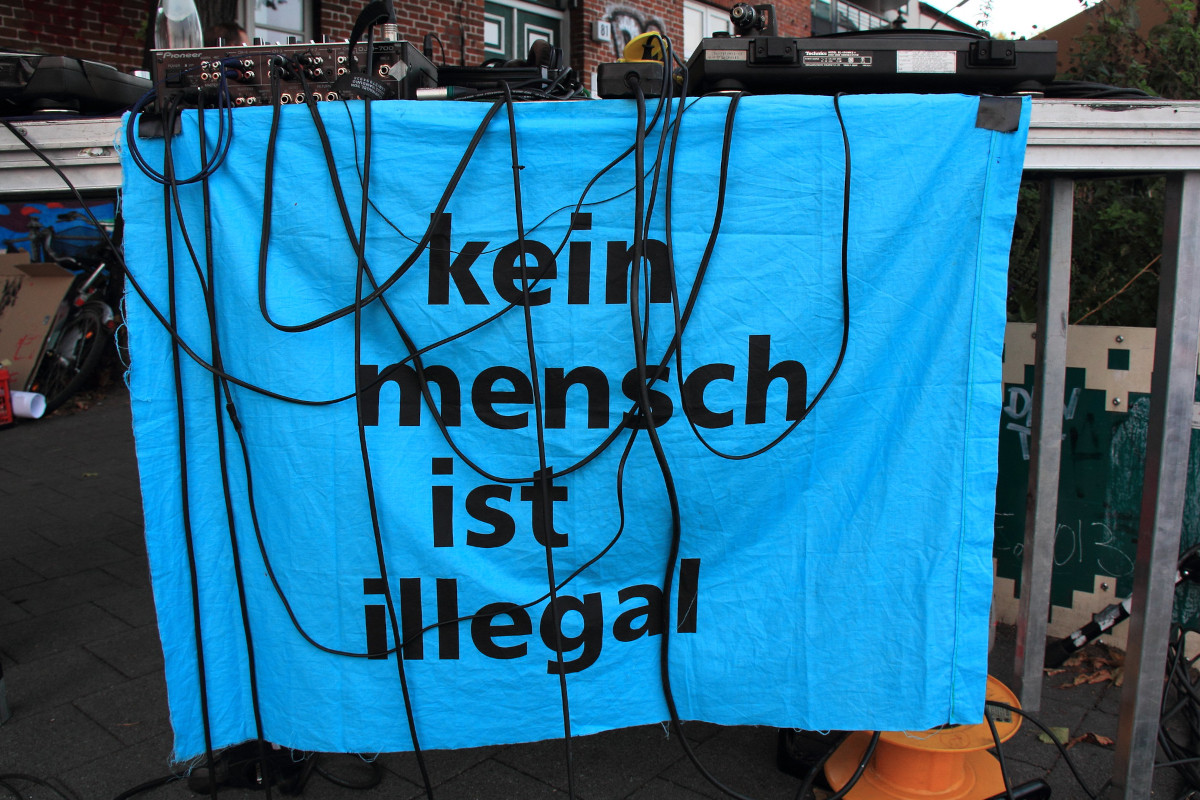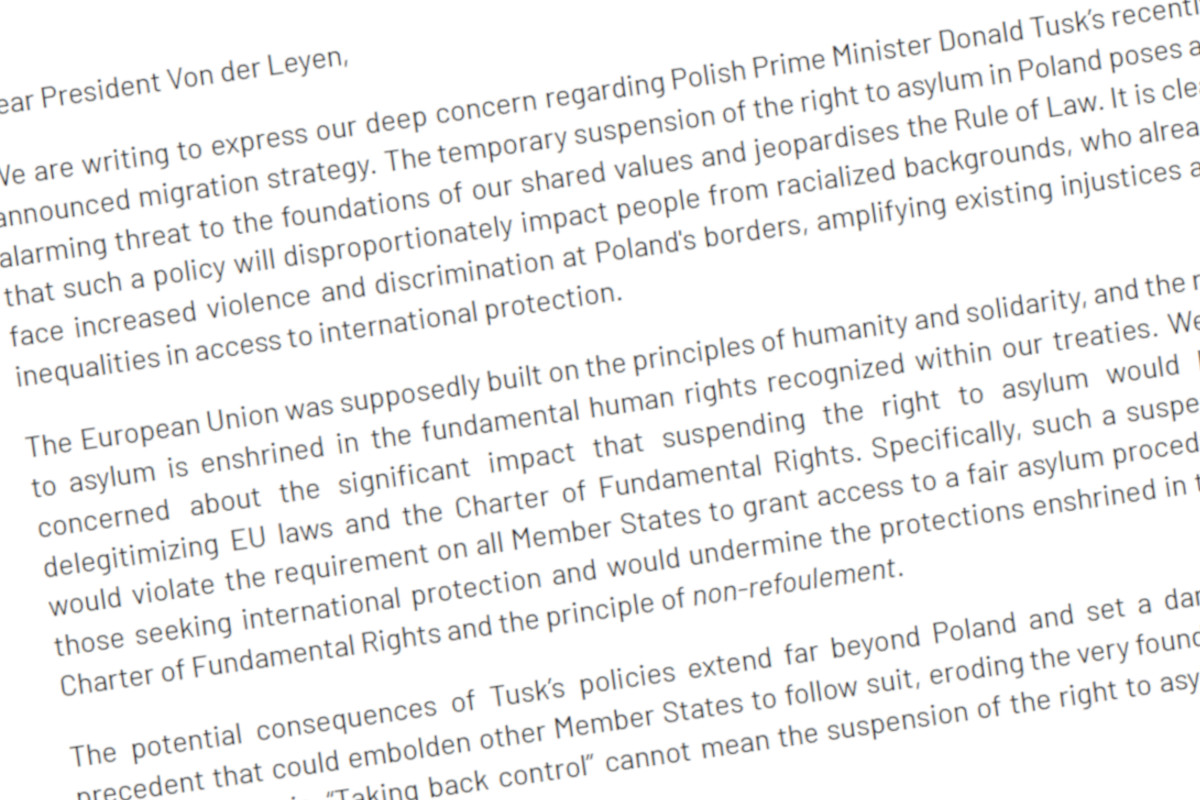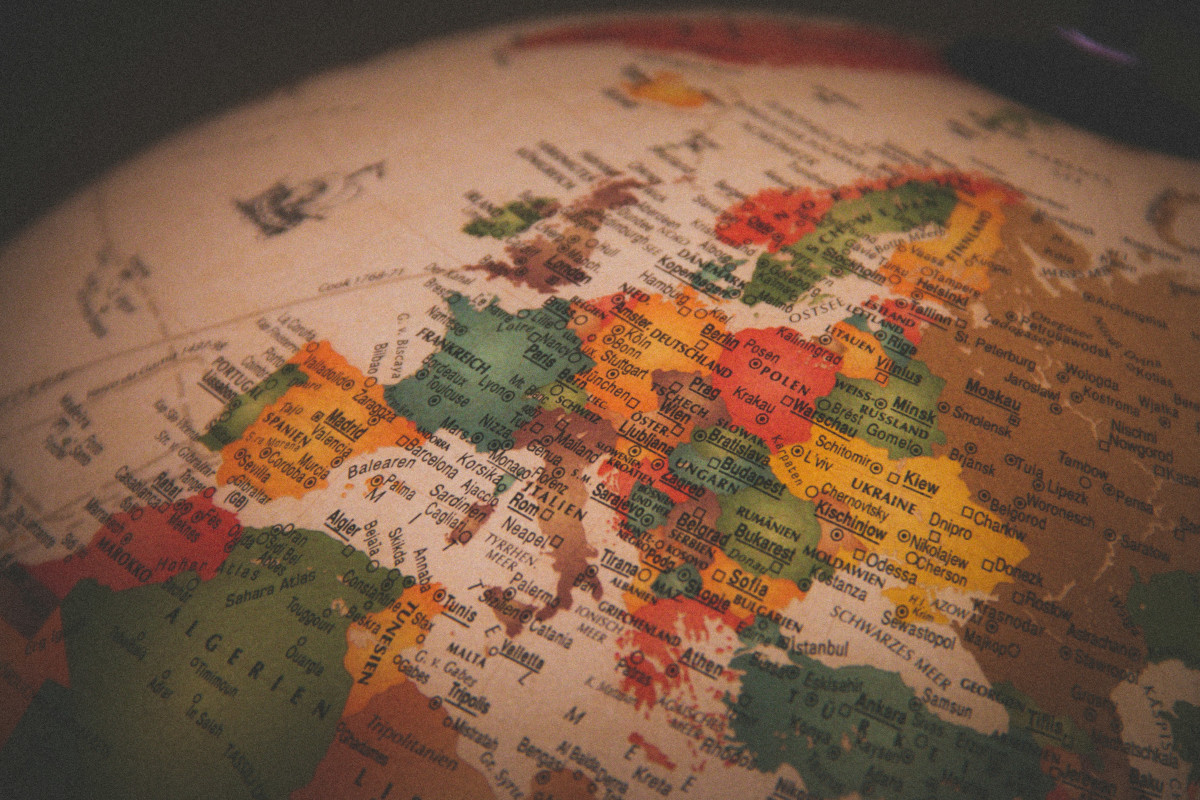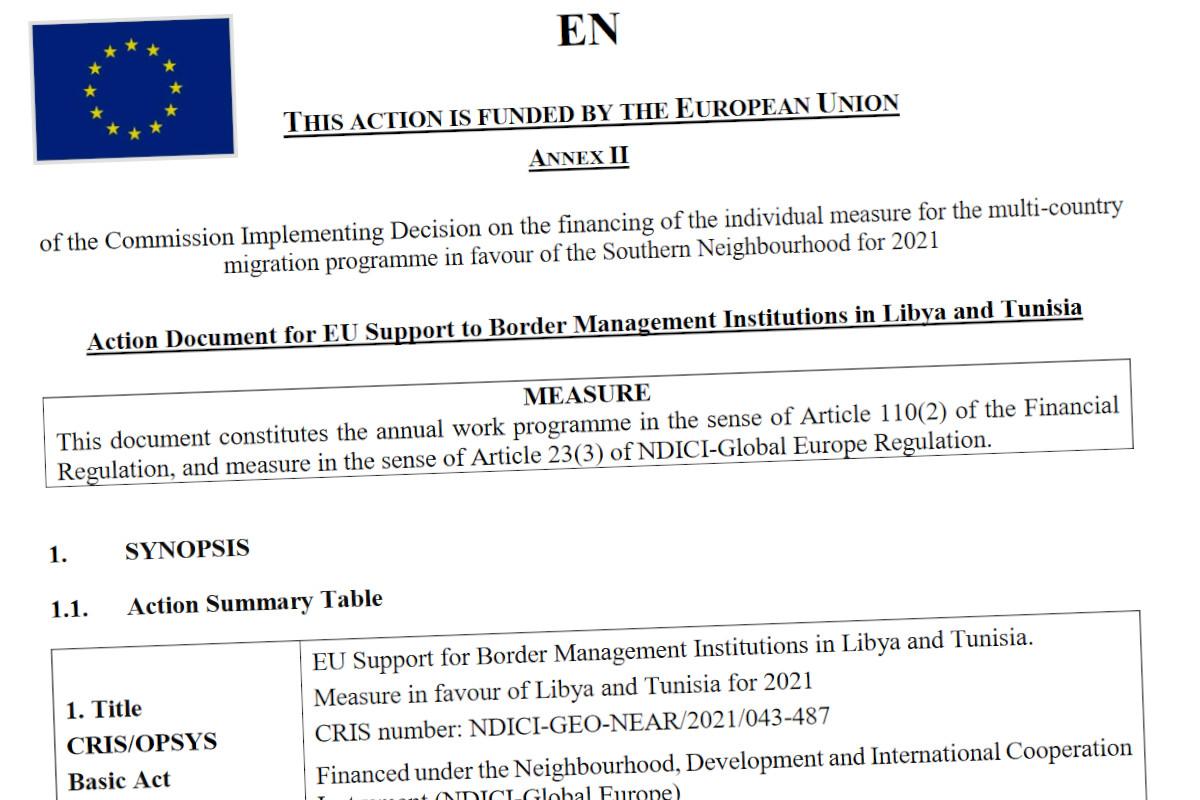Open letter condemns "illegal, immoral, and unworkable" immigration and asylum policies
Topic
Country/Region
06 November 2024
A letter to EU leaders backed by 200 organisations and individuals, including Statewatch, condemns the renewed "violent, punitive and immoral turn in European migration politics." This turn can be seen in recent proposals to suspend the right to asylum, introduce offshore deportation camps, and create new common lists of "safe" countries, says the letter. "Rather than orient policies toward safety, protection and social provision for all, European leaders have settled for a politics of securitisation, criminalisation, and violence," it says. The letter goes on to make proposals for "human rights, toward economic well being, safety and community care, and invest in long-term solutions to address climate degradation, conflict, and economic decline."
Support our work: become a Friend of Statewatch from as little as £1/€1 per month.

A banner at a refugee protest in Berlin, 2014. Image: Rasande Tyskar, CC BY-NC 2.0
The letter was drafted by Equinox Initiative for Racial Justice, Greek Forum of Migrants, International Women* Space, Movement for Asylum Seekers in Ireland (MASI) and Equipo del Decenio Afrodescendiente.
Ursula von der Leyen, European Commission,
EU Interior Ministers,
We, organisations led by migrants and racialised people, along with our supporters, write to European leaders to condemn the violent, punitive and immoral turn in European migration politics in recent weeks.
In recent weeks, we, residents of Europe organising amongst both new and long-standing migrant communities, have watched as EU leaders have declared war on migrants and international law.
From illegal proposals to suspend the right to asylum and adopt offshore migrant processing models, the creation of EU ‘safe’ third-country lists and extended periods of internal border checks in the Schengen area, to our consistent reality of prison-like detention centres, state violence and racial profiling, illegal pushbacks and violent and unlawful deportations, European leaders have reached a point of no return.
These announcements are part of a trajectory of worsening demonisation of migrants and the complete erosion of international law. For almost a decade, the European Union has pursued violent, ineffective and expensive migration measures that expand prison-like detention centres, endorse racial profiling and facilitate pushbacks and violence at borders.
Human rights organisations have consistently framed these developments as flagrant violations of international law. We agree. However, we should also clarify that European leaders are unashamedly emulating a fascist politics reminiscent of Europe’s genocidal and colonial history. We see the consistent demonisation and blame of our communities as a clear attempt to distract Europe’s residents from decades of political, economic and environmental failures.
Rather than orient policies toward safety, protection and social provision for all, European leaders have settled for a politics of securitisation, criminalisation, and violence. The EU has pursued migration policies geared toward criminalising our communities, militarising borders, and endorsing far-right and racist violence.
What you frame as a ‘migration crisis’, is actually a global inequality crisis. Recent announcements on migration conveniently evade responsibility for Europe’s past and present role contributing to the root causes of migration: displacement caused by climate change and environmental destruction, resource and wealth extraction, colonialism, conflict, military intervention and political destabilisation. The EU is presenting an inhuman, unworkable response to problems it itself has created and contributed to.
Attacks on migrants rights are the beginning of attacks on everybody. Anti-migrant politics and the subsequent degradation of rights have opened the door for rollbacks in women’s rights and the right to abortion, anti-gender movements, anti-worker movements and the widespread repression of civil liberties. The far-right forces that birthed this narrative and the centrist ones that normalise them are responsible for broader threats to democracy and the rule of law. Collectively, these trends disproportionately impact communities at risk of state violence, including (undocumented) migrants, racialised, queer and trans people, and sex workers.
We call on leaders to change course and present a meaningful alternative to current EU migration policy, which is illegal, immoral, and unworkable.
Instead of wasting billions on new offshore detention centres, illegal and costly deportation procedures, and the militarisation of borders, European leaders could implement policies in compliance with human rights, toward economic well being, safety and community care, and invest in long-term solutions to address climate degradation, conflict, and economic decline.
We need:
- Safe and legal routes for migrants, asylum seekers and refugees;
- Pathways to regularisation and an end to the criminalisation of people on the move;
- Address the root causes of why people flee their countries, including by ending EU investment in the militarisation and securitisation of borders, the weapons trade, fossil fuels, and other industrial strategies contributing to conflict and climate degradation in the global South;
- Policies that focus on addressing the needs of all people (including migrants, shift and gig economy workers, unpaid carers, and those in precarious work) instead of prioritising corporate profits;
- A comprehensive economic and social strategy for everyone living in Europe.
We call on European leaders to change course and end their war on migrants. Instead, reorient your policies to centre a politics of care, protection and safety for all, including migrant communities.
Drafted by:
- Equinox Initiative for Racial Justice – Europe
- Greek Forum of Migrants – Greece
- International Women* Space – Germany
- Movement for Asylum Seekers in Ireland (MASI) – Ireland
- Equipo del Decenio Afrodescendiente – Spain
Signatories
- Academics for Peace-Germany, Germany
- Acollides Feministes – Transformem juntes, Spain
- Agora Association, Turkey
- Akoma, Germany
- Albanian Community in Greece, Greece
- AlgoRace, Spain
- All Faiths and None, United Kingdom
- Almena Cooperativa Feminista, Spain
- APROSEX, Spain
- Ariadni A.M.K.E., Greece
- Associació intercultural diàlegs de dona, Spain
- Association de soutien aux travailleurs immigrés – ASTI asbl, Luxembourg
- Association Tunisienne des Femmes Democrates ATFD, Tunisia
- BARAC UK, United Kingdom
- Border Criminologies
- Cantiere, Italia
- Centre for Information Technology and Development, Nigeria
- Centre of legal aid “Voice in Bulgaria”, Bulgaria
- Citizen D / Državljan D Slovenia / EU
- Comitato 3 Ottobre – ETS, Italy
- Conflict Kitchen Foundation / Kuchnia Konfliktu, Poland
- Congolese Community of Brazzaville in Greece, Greece
- Conselho de Cidadania do Brasil em Barcelona, Spain
- EDUXO ITALIA APS, Italy, Belgium, Spain
- EL*C, Europe and Central Asia
- EmpowerVan, Greece / Switzerland
- European Network Against Racism, Europe – wide
- European Network for the Promotion of Rights and Health among Migrant Sex Workers, Europe
- European Network on Religion and Belief, Europe-wide
- European Sex Workers’ Rights Alliance (ESWA), Pan European
- European Union of Women Marina Alta, Spain
- Feminist Collective of Romani Gender Experts
- Flüchtlingshilfe Iran e.V.2010, Germany
- forRefugees, UK
- GAT – Grupo de Ativistas em Tratamentos, Portugal
- Ghanaian Nationals Association in Greece, Greece
- Global Women Against Deportations, England
- Greek Forum of Refugees, Greece
- Hidden Goddess, Greece
- Hoffnung leben e.V., Germany
- HOTM, Belgium
- IGLYO – The International LGBTQI Youth and Student Organisation, Belgium
- Infokolpa, Slovenia
- Ivorian community of Greece, Greece
- KISA- Action for Equality, Support, Antiracism, Cyprus
- Lesvos Solidarity, Greece
- Migrant Tales, Finland
- Migrationsrat Berlin e.V., Germany
- Mulheres Brasileiras contra o fascismo e o racism, Spain
- New Women Connectors, Netherlands
- Nigerian Community Greece, Greece
- Northern Ireland Council for Racial Equality, United Kingdom/Northern Ireland
- One Billion Rising Frauengruppe, Germany
- Racism and Technology Center, Netherlands
- Red Española de Inmigración y Ayuda al Refugiado, Spain
- Refugees in Libya, Italy, Libya
- Refugees Welcome España, Spain
- Revibra Europe, EU
- Romnja Feminist Library
- S.P.E.A.K ( Muslim women collective), The Netherlands
- Safe Passage International, Europe (UK, France, Greece)
- Samos Volunteers, Greece
- Sant Just Solidari, Catalunya
- Siempre ong, Belgium
- Solidaridad Entre PErsonas Integrando Comunidades- SOEPIC, Spain
- Spazio di Mutuo Soccorso, Italia
- The German Center for Integration and Migration Research (DeZIM), Germany
- Trans United Europe-BIPOC European trans network, France
- VELOS YOUTH, Greece
- WeMove Europe, Europe
- Women in Development Europe (WIDE+), Europe
- Women of Colour in Global Women’s Strike, England
- women’s council Dest Dan e.V., BRD
- Yoga and Sport with Refugees, Greece/ France
Supporters - #StopFisha, France
- Abolish Frontex
- ACAT Belgium, Belgium
- Access Now, Belgium/Europe
- aditus foundation, Malta
- Anti Racism Movement, Lebanon
- Anti-Racism Crew Flensburg, Germany
- Asociación Nós Mesmas, Spain
- Aspiration, Belgium
- Association for Integration and Migration, Czech Republic
- barkwende e.V Deutschland, Germany
- Border Violence Monitoring Network
- Bündnis90 /Die Grünen Rosenheim, Germany
- Centre for Peace Studies, Croatia
- Comisión Legal Sol, Spain
- Comitato per i Diritti Civili delle Prostitute APS, Italy
- Coordinadora Obrim Fronteres, Catalonia
- Creación Positiva, Spain
- ECHO100PLUS, Greece
- Equal Legal Aid, Greece
- ERA LGBTI Association for Western Balkans and Turkiye, Western Balkans and Turkiye
- ESPACE P… ASBL, Belgium
- EUR, Greece
- European Center for Constitutional and Human Rights (ECCHR), Germany
- Flüchtlingsbetreuung Herzogenaurach, Germany
- Flüchtlingsrat Niedersachsen, Germany
- Flüchtlingsrat Schleswig-Holstein e.V., Germany
- Front d’habitat lesbien, France
- Fundació Autònoma Solidària, Spain
- Fundación Alianza por la Solidaridad-ActionAid, Spain
- Fundacja Inicjatywa Dom Otwarty, Poland
- Fündec foundation, Spain
- Greek Council for Refugees (GCR), Greece
- Greens Regensburg, Germany
- Griesehop, Germany
- Habibi.Works (Soup and Socks e.V.), Greece
- Human Rights Association (İHD), Turkey
- Integral Germany, Germany
- Inter Alia, Greece
- InterEuropean Human Aid Association (IHA)
- INTERSOS HELLAS, Greece
- Irídia – Centre per la Defensa dels Drets Humans, Spain
- Jüdische Stimme für gerechten Frieden in NahOst e.V., Germany
- Khebra Germany
- Kif Kif vzw, Belgium
- Kopanang Africa Against Xenophobia, South Africa
- La Strada International, Netherlands
- Leibniz Zentrum Moderner Orient, Germany
- Mobile Info Team, Greece
- MV Louise Michel
- N4D, Austria
- Panoptykon Foundation, Poland
- PICUM, Europe/ International
- Pride des Banlieues, France
- Projecte Acollides féministes, Spain
- Red en Defensa de los Derechos Digitales (R3D), México
- Refugee Law Clinic Dresden, Germany
- Refugee Legal Support (RLS), UK / France / Greece
- Salud por Derecho, Spain
- Sea-Watch
- Seebrücke Nordfriesland
- Servei Civil Internacional, Catalunya
- SOLIDAR, Belgium
- Statewatch
- Transnational Institute
- Verdi, Lachesis e.V.
- Wildkräuterschule Artemisia, Germany
- Adele Del Guercio (University of Naples L’Orientale), Italy
- Alexandra Kuon, Germany
- Angela Büttner, Germany
- Anna (International Women* Space), Germany
- Asli Telli (Wits University), Germany
- Bruna Romano Pretzel (Humboldt-Universität zu Berlin), Germany
- Chiara del core, Italy
- Diana Podar (Bielefeld University), Germany
- Diógenes Parzianello, Portugal
- Dr. Mirjam Twigt
- Francesca Cogni, Italy
- Grace Franck Germany
- Ilaria De Capitani
- Jan Tobias Muehlberg (Universite Libre de Bruxelles), Belgium
- Jara Henar, Europe
- Jonathan Bloch, United Kingdom
- Judith Membrives i Llorens (UOC), Spain
- Juli Saragosa (Catalyst Institute of Creative Arts and Technology), Germany
- Julia löschner, Germany
- Juliana Santos Wahlgren, Belgium
- Juliette Vandame, Germany
- Jürgen Prade, Germany
- Laura Jung (University of Graz), Germany
- Laure Baudrihaye (Université Libre de Bruxelles), Belgium
- Leonie Sontheimer, Germany
- Lydia Karagiannaki
- Magdalena Maier, Belgium
- Mara Junge (University of Bremen, German Centre for Integration and Migration Research (DeZIM)), Germany
- Mariam Camilla Rechchad, Belgium
- Marita Blessing, Germany
- Marta Pompili, Belgium
- Mathilde du Jardin (Université libre de Bruxelles), Belgium
- Mercedes Povedano, Germany
- Mher Hakobyan, Belgium/EU
- Nastasja Scholz
- Orcun Ulusoy (Vrije Universiteit Amsterdam), Netherlands
- Peter Weis, Germany
- Rakhal Zaman, Germany
- Rebecca Steel-Jasinska, Belgium
- Rogier van Reekum (Erasmus University Rotterdam), Netherlands
- Rosemary Storkey, United Kingdom
- Roy Konings (KU Leuven), Belgium
- Sal González Leal, Germany
- Sarah Hergenröther, Germany
- Sayra Latif, Germany
- Shelley Anderson, Netherlands
- Suzanne Dominguez, Belgium
- Sydney Ramirez (University of Kassel), Germany
- Tahin Demiral, France
- Teresa Pedreira, Belgium/Brussels
- Ulrike Janz, Germany
- Zeynep Kasli (International Institute of Social Studies, Erasmus University Rotterdam), Netherlands
- Zina Weisner (Department for Migration and Globalisation, University Krems), Austria
Would you or your organisation like to sign onto the letter?
Add your name here.
Our work is only possible with your support.
Become a Friend of Statewatch from as little as £1/€1 per month.
Further reading

European Commission must take a "decisive and unequivocal stand against" Poland's suspension of asylum
More than sixty organizations, including Statewatch, and 10 MEPs, have signed a letter to the European Commission demanding a "decisive and unequivocal stand against" the Polish government's decision to suspend the right to seek asylum. The country's prime minister, Donald Tusk, announced the plan last month in response to people arriving across the Polish-Belarussian border.

EU: Hungarian Council presidency takes aim at refugees and asylum-seekers
In a move that is unlikely to surprise anyone, the Hungarian Council Presidency has kicked off discussions on reviewing the status of international protection beneficiaries, and how member states deal with individuals whose asylum applications have been refused, but who cannot be deported.

Implementing the Pact: Commission calls for accelerated deportation procedures
The Commission has called on EU institutions and member states to ramp up efforts to prepare for the deportations that will result from the new “return border procedure” introduced by the Pact on Migration and Asylum. The proposals come in a classified report obtained by Statewatch, which assesses non-EU states’ level of cooperation with removals from the bloc.
Spotted an error? If you've spotted a problem with this page, just click once to let us know.

